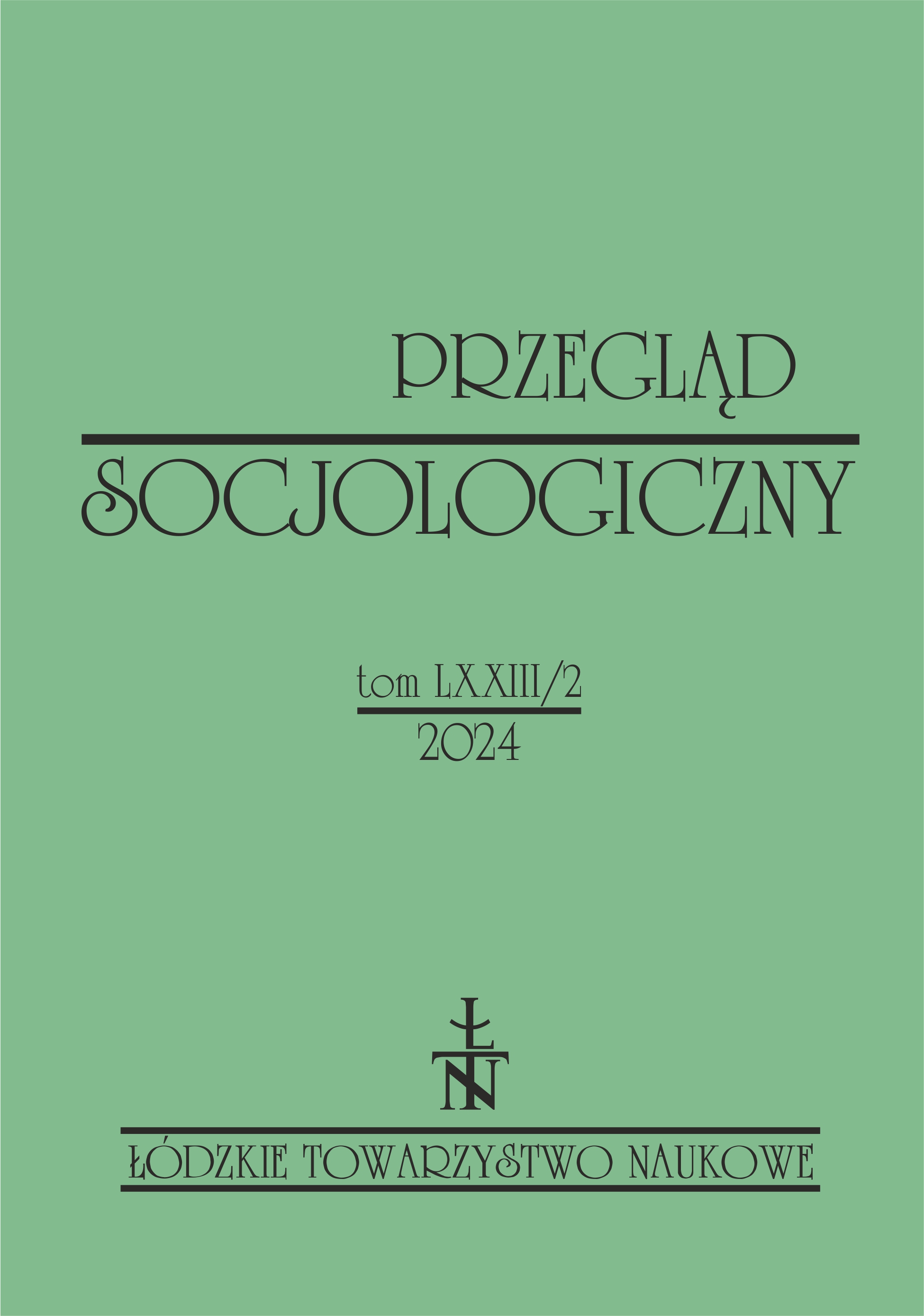Ciotkostwo w sieci relacji i praktyk rodzinnych. Analiza literatury przedmiotu
DOI:
https://doi.org/10.26485/PS/2024/73.2/7Słowa kluczowe:
ciotkostwo, praktyki rodzinne, siostrzenice, bratankowie, rodzina społeczna, rozszerzona rodzinaAbstrakt
Relacje między kobietami a dziećmi nadmiernie często sprowadzane są wyłącznie do relacji między matką a potomstwem. Mimo dostrzeżenia wielowymiarowości pojęcia rodziny wciąż w socjologii dominuje skupienie na relacjach między rodzicami i dziećmi oraz parami intymnymi. Tymczasem macierzyństwo nie jest jedynym doświadczeniem i wzorem bliskich relacji między kobietami a dziećmi. Jedną z nich jest ciotkostwo. Na podstawie analizy literatury poświęconej ciotkostwu wskazuję sposoby definiowania, kim jest ciotka i kto może się nią stać, oraz jakie oczekiwania są pod jej kątem wysuwane. Omawiam praktyki rodzinne i formy obecności ciotek w relacjach z siostrzenicami i bratankami, m.in. pracę relacyjną, pracę opiekuńczą, wspieranie ich w sytuacjach kryzysowych, modelowanie zachowań oraz odrzucanie przez ciotki norm macierzyńskich opieki i poświęcenia. Analizuję również znaczenia, jakie dla ciotek i siostrzenic oraz bratanków ma fakt istnienia relacji między nimi. Ciotkostwo oferuje wgląd w niemacierzyńskie relacje między kobietami i dziećmi, w których obie strony mogą zachować swoją sprawczość.
Bibliografia
Barnwell Ashley. 2019. “Family secrets and the slow violence of social stigma”. Sociology 53(6): 1111–1126. https://doi.org/10.1177/0038038519846443.
Barnwell Ashley. 2022. “Aunting as family shadow-work”. Journal of Family History 47(3): 317–331. https://doi.org/10.1177/03631990221079784.
Burman Erica. 2008. “Beyond ‘women vs. children’ or ‘women and children’: Engendering childhood and reformulating motherhood”. International Journal of Children’s Rights 16: 177–194. https://doi.org/10.1163/157181808X301773.
Conley Dalton. 2005. The pecking order: A bold new look at how family and society determine who we become. New York: Pantheon Books.
Davis-Sowers Regina. 2012. “«It just kind of like falls in your hands»: Factors that influence black aunts’ decisions to parent their nieces and nephews”. Journal of Black Studies 43(3): 231–250. https://doi.org/10.1177/0021934711415243.
di Leonardo Micaela. 1987. “The female world of cards and holidays: Women, families, and the work of kinship”. Signs: Journal of Women in Culture and Society 12(3): 440–453.
Doyle Celia. 2001. “Surviving and coping with emotional abuse in childhood”. Clinical Child Psychology and Psychiatry 6(3): 387–402. https://doi.org/10.1177/135910450100600300.
Ellingson Laura L., Patricia J. Sotirin. 2006. “Exploring young adults’ perspectives on communication with aunts”. Journal of Social and Personal Relationships 23(3): 483–501. https://doi.org/10.1177/0265407506064217.
Ellingson Laura L., Patricia J. Sotirin. 2010. Aunting: Cultural practices that sustain family and community life. Waco: Baylor University Press.
Ensor Sarah. 2012. “Spinster ecology: Rachel Carson, Sarah Orne Jewett, and nonreproductive futurity”. American Literature 84(2): 409–435. https://doi.org/10.1215/00029831-1587395.
Essock-Vitale Susan, Michael T. McGuire. 1985. “Women’s lives viewed from an evolutionary perspective. II patterns of helping”. Ethology and Sociobiology 6(3): 155–173. https://doi.org/10.1016/0162-3095(85)90028-7.
Finch Janet. 2007. “Displaying families”. Sociology 41(1): 65–81. https://doi.org/10.1177/0038038507072284.
Granovetter Mark S. 1973. “The strength of weak ties”. American Journal of Sociology 78(6): 1360–1380.
Hayden Sara. 2011. “Constituting savvy aunties: From childless women to child-focused consumers”. Women’s Studies in Communication 34(1): 1–19. https://doi.org/10.1080/07491409.2011.566531.
Hill Alexandra M. 2014. “Childless woman as failure; or, the «Spinster Aunt» as provocation for the future”. Women in German Yearbook 30: 164–174. https://doi.org/10.5250/womgeryearbook.30.2014.0164.
Lahad Kinneret, Vanessa May. 2021. “Holding back and hidden family displays: Reflections on aunthood as a morally charged category”. Current Sociology 69(7): 1002–1017. https://doi.org/10.1177/0011392121992829.
Langer Nieli, Marie Ribarich. 2007. “Aunts, uncles–nieces, nephews: Kinship relations over the lifespan”. Educational Gerontology 33(1): 75–83. https://doi.org/10.1080/03601270600894279.
May Vanessa, Kinneret Lahad. 2019. “The involved observer: A simmelian analysis of the boundary work of aunthood”. Sociology 53(1): 3–18. https://doi.org/10.1177/0038038517746051.
Milardo Robert M. 2015. Forgotten kin: Aunts and uncles. Cambridge University Press.
Pashos Alexander, Donald H. McBurney. 2008. “Kin relationships and the caregiving biases of grandparents, aunts, and uncles”. Human Nature 19(3): 311–330. https://doi.org//10.1007/s12110-008-9046-0.
Sedgwick Kosofsky Eve. 1993. Tendencies. Durham: Duke University Press.
Sikorska Małgorzata. 2019. Praktyki rodzinne i rodzicielskie we współczesnej Polsce – Rekonstrukcja codzienności. Warszawa: Wydawnictwo Naukowe Scholar.
Sotirin Patty, Laura L. Ellingson. 2007. Rearticulating the aunt: Feminist alternatives of family, care, and kinship in popular performances of aunting. Cultural Studies ↔ Critical Methodologies 7(4): 442–459. https://doi.org/10.1177/1532708607304538.
Sotirin Patricia J., Laura L. Ellingson. 2013. Where the aunts are. Waco: Baylor University Press.
Stone Amy L., Chiara Pride, Benjamin Adams, Roberto Salcido. 2022. “Bisexual aunts, gaycousins: How LGBT Q family members help LGBT Q youth navigate family heteronormativity”. Socius 8. https://doi.org/10.1177/23780231221117145.
Tanskanen Antti O. 2015. “Childlessness and investment in nieces, nephews, aunts and uncles in Finland”. Journal of Biosocial Science 47: 402–406. https://doi.org/10.1017/s0021932014000339.
Thorne Barrie. 1987. “Re-Visioning woman and social change. Where are the children?”. Gender & Society (1)1: 85–109. https://doi.org/10.1177/089124387001001005.
Wedel Joanna R. 2007. Prywatna Polska. Warszawa: Trio.
Pobrania
Opublikowane
Jak cytować
Numer
Dział
Licencja
Prawa autorskie (c) 2024 Łódzkie Towarzystwo Naukowe

Utwór dostępny jest na licencji Creative Commons Uznanie autorstwa 4.0 Międzynarodowe.



